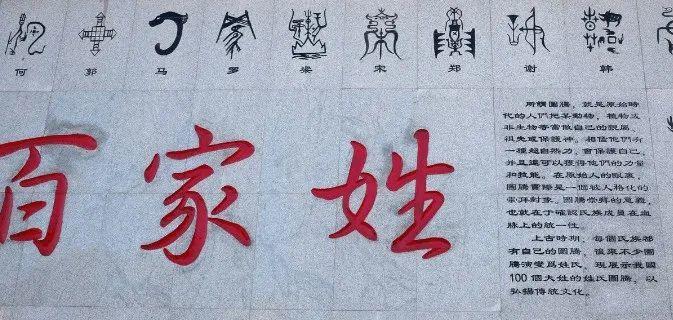The clan culture, which was born out of the matrilineal society, inevitably bears the imprint of the matrilineal society. The eight surnames of the ancients, almost all with the word "female" on the side.
Written in the Song Dynasty, "Hundred Family Names" has played a huge role in the inheritance of Chinese surname culture and the understanding of Chinese characters, which is also an important factor that can be passed down for thousands of years.
From the division of property, clan hugging, to blood inheritance, surname culture has always played its unique role.
Earlier we talked about the origin of the eight surnames in the ancient world. In general, there are generally the following sources of surnames.
It is derived from the animal names of the "totem worship" of the primitive social period; the ancestral surnames such as the eight surnames of the above ancients; the fiefdoms as surnames (early as tribes) and so on.

Also, what we are going to talk about today is the surname of an official.
In history, there are also many surnames involving the origin of official names, and we mainly know these 7 today.
Take the official position as the surname
Three have the name of the official compound surname
Friends who know the official position of the pre-Qin Dynasty should have heard of the Three Yousi.
Namely, Situ, Sikong, and Sima .
Among them, Situ originated in the period of Emperor Shun. During Yao's reign, Shun served as a situ, a position equivalent to that of later chancellor, responsible for indoctrination. Later, it evolved from generation to generation, and Situ became a compound surname.
Sikong, an official name during the Shun Emperor period, was responsible for water conservancy and other matters. Dayu was once Emperor Shun's subordinate Sikong. After the founding of the Xia Dynasty, some descendants took the official position sikong as their surname.
Sima (司馬) is derived from The Father of Cheng Boxiu, the ruler of the army horses during the reign of King Xuan of Western Zhou. After meritorious service in battle, the official position is used as a surname and passed down from generation to generation.
Four official names
【Money】
Derived from Pengzu - real name 篯铿. His grandson Peng Fu served as a "sergeant of the Qian Dynasty" in the Western Zhou court, and Peng Fu's descendants changed their surname to an official position, and since then, the surname Qian has been passed down.
It is Mentioned in Zhuangzi's "Getaway" and Wang Xizhi's "Orchid Pavilion Collection", Peng Zu, who has lived for hundreds of years.
【Lee】
According to legend, the surname Li came from the Yellow Emperor. The ancestor of the Surname Li was named Gao Tao, and was a descendant of the yellow emperor's grandson. In charge of punishment, he was sometimes called "judge" or "judge".
His descendants were able to save their lives because they once hid under a plum tree during the escape and used plums to fill their hunger, so they changed their surname to "Li".
But speaking of which, gao tao ancestors are surnamed Ying, and further back, the Li family is actually from the surname of Ying.
【Zhang】
Zhang Hui, the ancestor of the surname Zhang, was the first person with the surname Zhang to be recorded. There is a folk saying that "the surname of Zhang in the world is out of the Qinghe River", because of Zhang Hui.
Because of inventing the bow and arrow to help the Yellow Emperor defeat Xuan You, Zhang Hui was given the title of "Bow Zheng", also known as "Bow Chief", the main manager of bow and arrow manufacturing management, etc., and gave Zhang the surname.
Speaking of which, this surname is not only an official surname, but also a surname given by the Yellow Emperor.
【History】
The ancestor of the Shi surname is Cangjie. After Cangjie was appointed "historical official" by the Yellow Emperor, he began to eat and sleep in the wind, relying on constant observation of the morphological characteristics of all things, and then invented hieroglyphs.
Because of his meritorious character creation, his descendants enjoyed the right to use the official position as a surname, and thus the surname Shi became a member of the surname.